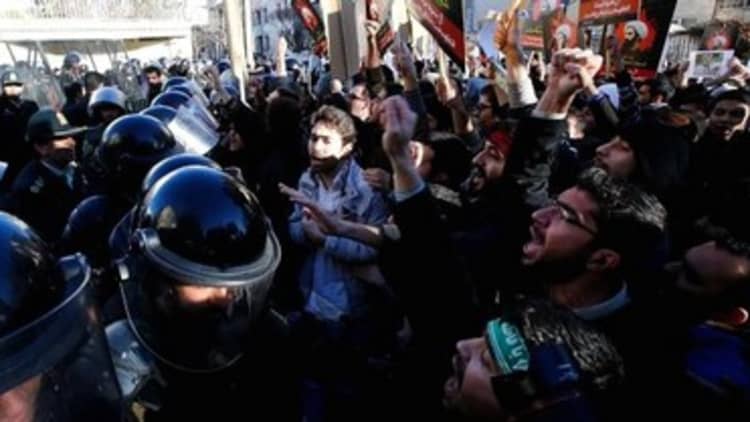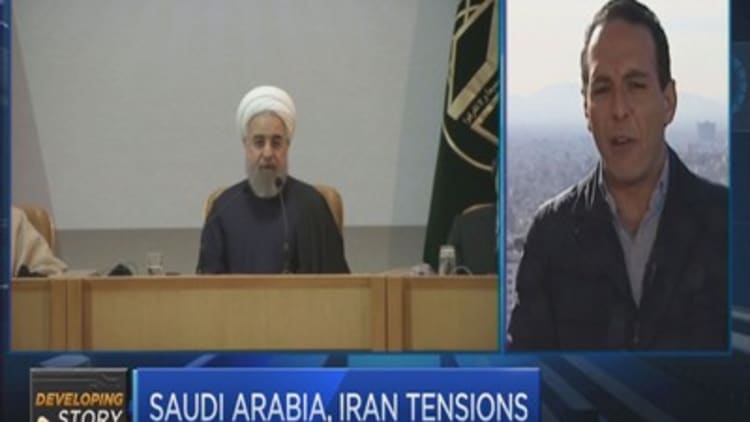


Armchair analysts have been predicting an oil price war between Saudi Arabia and Iran for a while now, and escalating tensions between the countries would seem to portend a major market disruption. But that war may never come.
Saudi Arabia announced Monday that it will sever all commercial ties with Iran, a day after the kingdom said it would cut diplomatic relations with Iran. Protesters stormed the Saudi embassy in Tehran earlier Sunday, and the country's supreme leader, Ayatollah Ali Khamenei, predicted "divine vengeance" for the Saudi execution of a major Shiite cleric.
Saudi Arabia is predominantly Sunni and home to many of Islam's most important holy sites, while Iran is the center of Shiite power for the Islamic world. The two countries are opposite poles in the Middle East's religious politics. Both also possess massive oil reserves.
Responding in part to the acrimony, Brent crude jumped more than 4 percent Monday morning, but many market watchers predict that 2016 will be a year of significantly increased global supply (and therefore lower prices) as international sanctions against Iran come to an end and that country brings more crude to market.
Iran has already said that it plans to ramp up production, aiming to export an additional million barrels per day into global markets within six months — a move that its oil minister says is "not seeking to disrupt the market," but instead help Iran regain lost market share. And while most reports say Iran and Saudi Arabia could increase their production until the price is into the single digits, experts told CNBC that the two Middle Eastern powers won't take things that far.
"I think [Iran's] primary interest will be their own economic priorities," said Hani Sabra, the head of Eurasia Group's Middle East and North Africa practice. "And their desire to sell oil is not driven by a desire to drive the price down to hurt the Saudis; it's driven by a desire to make money."
According to Again Capital's John Kilduff, "the math is simple" to show that Iran would make more money selling fewer barrels at a higher price.
Moreover, if Tehran were interested in using oil to hurt the Saudis, it's unlikely it would succeed in the long run anyway, experts said. Riyadh has already signaled that it is hunkering down for an extended period of low prices by cutting subsidies and other government spending in an effort to shrink its 2016 deficit.
In addition to a low cost of production, Saudi Arabia also boasts extensive foreign currency reserves, and previously untapped opportunities in the international debt markets. "They haven't even gotten creative yet," Kilduff said, listing asset-backed bonds as an example of potential options for the kingdom.
"It's only a race to the bottom: Yeah, the Iranians have been beating their chests that they deserve to have no quota, as they missed a lot of the bloom years as a result of the nuclear sanctions, but the only alternative is to have a scorched earth where everyone is pumping as much as they can," Kilduff said. "And who is the last man standing? I wouldn't bet on the Iranians winning that one — I'm sticking with Saudi (Arabia) for that."
And while Riyadh has the means to defend itself against an Iran-instigated price war, there's little to be gained by the Saudis if they start one. Richard Hastings, macro strategist at Seaport Global Securities, said any Saudi push for lower prices would be unlikely to deter Iran from bringing its product to market.
"I don't think you're going to see prices get pulled down in a dramatic way," Hastings said. "I don't see how lower prices driven by Saudi Arabia would make a difference in Iran's story: It would just make their price more attractive to the refinery that's going to buy it. It doesn't really stop it from happening."
So oil may prove an imperfect weapon in the conflict between Riyadh and Tehran, but that doesn't mean the countries will let tensions ease: There are other economic (and military) means by which the rivalry can play out.
"Are Iran and Saudi Arabia competitors? The answer is yes. Is that competition intense? Absolutely. Is the level of the intensity of that competition going to increase? Yes," Sabra said. "But the idea that the primary tool for that competition is oil is false."
But even if geopolitical antagonism won't start a price war between the two countries, they are unlikely to cooperate with each other through the auspices of OPEC, where both countries are members, anytime soon: Experts were quick to tell CNBC that the oil cartel is all but dead in the current environment.
"OPEC does seem to be a bit of a hollow tiger. It does seem to be a bit of a piñata," Hastings said. "It's just not what it was 30 years ago."





